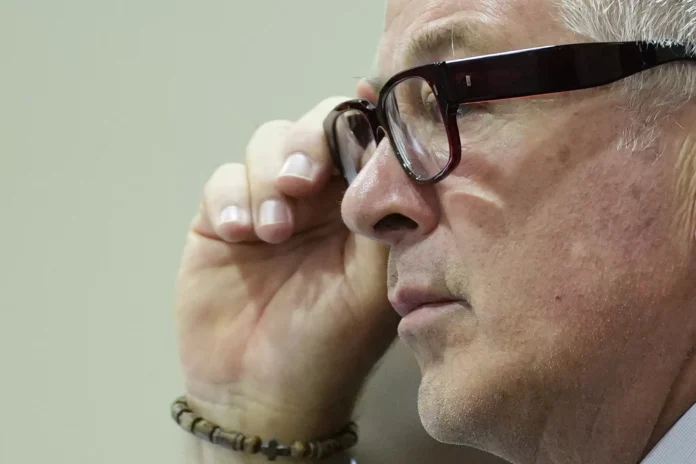The lead detective in the shooting of cinematographer Halyna Hutchins on the set of the film “Rust” is likely to take the stand for most of Friday at Alec Baldwin’s involuntary manslaughter trial in New Mexico. As the trial continues, prosecutors are painting Baldwin as a reckless cavalier with a gun in his hand, while the defense is portraying him as a working actor simply doing his job.
Cpl. Alexandria Hancock of the Santa Fe County Sheriff’s Office didn’t become the chief investigator until two weeks after the October 2021 shooting. However, she conducted the initial interviews of Baldwin, “Rust” armorer Hannah Gutierrez-Reed, and assistant director David Halls – the three individuals who are facing criminal charges in the case.
Hancock briefly testified on Thursday and will continue her direct examination by the prosecution on Friday. She is then expected to undergo a lengthy cross-examination by the defense, as they seek to challenge the investigation that they believe unfairly targeted Baldwin.
Before Hancock’s testimony, Italian gunmaker Alessandro Pietta took the stand on Thursday to discuss the quality control process in the manufacturing of the gun that was involved in the fatal shooting. The gun was acquired by an Albuquerque-based gun and ammunition supplier to “Rust”, and it was handled by Baldwin. Pietta last examined the gun in 2018 through a sales and distribution company.
The defense is questioning the gun’s provenance and its use in trade shows for several years. They are raising concerns that the gun may have been modified or could discharge under certain circumstances without a trigger pull.
Both Pietta and a sales distributor who handled the gun as recently as September 2021 testified that the revolver was in good working condition and had not been modified. Pietta also noted that the hammer on the gun will only drop with a trigger pull.
“If you want to release the hammer, you have to pull the trigger,” he told the courtroom.
However, standard practice is to only load the gun with five rounds instead of six to ensure that the firing pin does not rest on a live round. Gun experts, including an FBI forensic expert, have acknowledged that the revolver can discharge if pressure is applied to the hammer while resting on a live round.
Baldwin claims that the gun fired accidentally after he followed instructions to point it towards Hutchins, who was behind the camera. Unaware that the gun was loaded with a live round, he says he pulled back the hammer – not the trigger – and the gun fired.
The judge is set to consider striking testimony from Thursday regarding a “good Samaritan” who went to a sheriff’s station with a supply of ammunition that he claimed was involved in the fatal shooting. This issue came up during the defense’s questioning of sheriff’s crime scene technician Marissa Poppell. Baldwin’s lawyer, Alex Spiro, suggested that authorities were overly cozy with the film’s firearms supplier, Seth Kenney, and did not thoroughly investigate whether he was responsible for the fatal ammunition reaching the set.
Spiro asked Poppell if the “good Samaritan” brought the ammunition into the sheriff’s department, to which she replied yes, and she had written a report on it. She denied allegations that she had “buried” this information to keep it from the defense.
Poppell was also asked if the man had told her that they had been duped by Seth Kenney, to which she said she had no recollection. The prosecution dismissed these claims, stating that the source of the ammunition was Troy Teske, a friend of Gutierrez-Reed’s father with ulterior motives to shift the blame. The bullets were also not the same size as the live rounds found on the “Rust” set, including the one that killed Hutchins.
Special prosecutor Kari Morrissey sought to defend Kenney’s role in her questioning of Hancock.
“Did you ever discover any evidence throughout your entire investigation that Seth Kenney supplied live rounds to the set of ‘Rust?’” Morrissey asked. Hancock replied no.
Kenney has not been charged with any wrongdoing, and an email sent to his attorney seeking comment was not immediately returned.
Gutierrez-Reed’s lawyer, Jason Bowles, informed the press that prosecutors may call her to testify. However, Gutierrez-Reed will invoke her Fifth Amendment rights against self-incrimination, as she has an appeal of her conviction pending.
The judge declined to grant prosecutors’ pretrial request to

